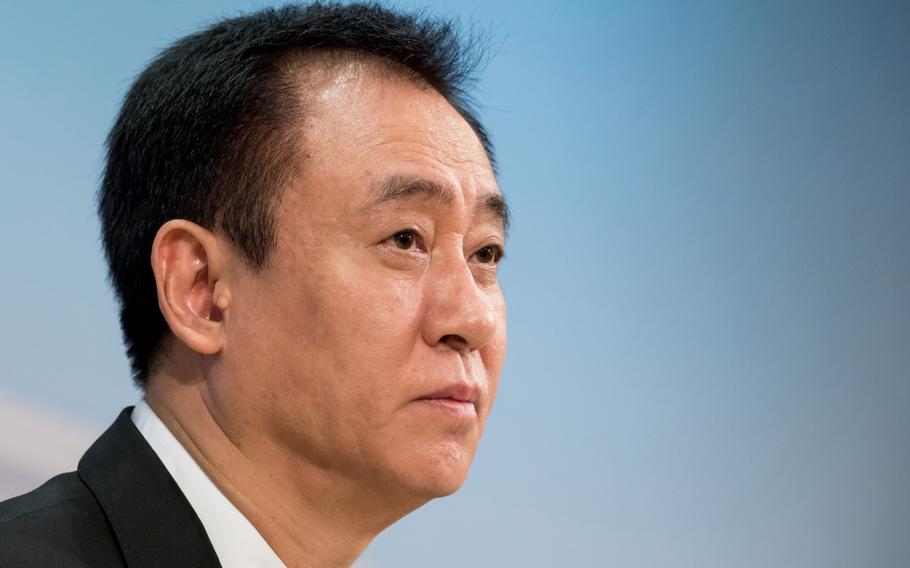
Hui Ka Yan, chairman of China Evergrande Group, pauses during a news conference in Hong Kong on March 26, 2019. MUST CREDIT: Bloomberg photo by Paul Yeung. (Paul Yeung/AP)
CHINA-EVERGRANDE 784 words · 1 photo Communist Party meeting may hint at Evergrande tycoon’s fate (c) 2022, Bloomberg · Venus Feng · WORLD, ASIA-PACIFIC · Feb 24, 2022 - 10:11 AM When China Evergrande Group Chairman Hui Ka Yan showed up at the Communist Party’s 100th anniversary celebration in July, investors saw it as a sign the government still had the embattled property tycoon’s back.
Another test is looming.
A top advisory body that counts the billionaire as a member is having its annual convention next week. The question among investors eager for signs about the fate of Hui and his empire: Will he show up?
Much has changed since July. Evergrande has officially become a defaulter and authorities from the developer’s home province of Guangdong are among those leading what could be one of the nation’s biggest debt restructurings. Creditors have filed hundreds of lawsuits and local governments have imposed restrictions on some of its property projects, including at least one demolishing order. The company’s shares and bonds are trading near record lows.
“Unless Hui is super sure that Evergrande will make a successful comeback and remain a powerful presence in the real estate sector, I don’t think he would show up in this year’s meeting,” said Willy Lam, an adjunct professor at the Centre for China Studies of the Chinese University of Hong Kong, who has authored books on Chinese politics. “Xi Jinping doesn’t want such a controversial figure to show up.”
Lam said that’s partly due to Xi’s focus on “common prosperity,” a wide-ranging campaign to distribute wealth more evenly. While Hui remains one of China’s richest men, Evergrande’s debt crisis has imposed losses on thousands of individual investors and delayed work on many of the developer’s more than one million unfinished homes.
The Chinese People’s Political Consultative Conference, whose more than 2,000 members include the nation’s most prominent politicians and entrepreneurs, gathers once a year to discuss areas ranging from new laws, policies and the economy. Delegates, like Hui, typically submit proposals on major political and social issues and may take questions from reporters during the meetings that can stretch for about a week.
Evergrande’s chairman was elected to join the political advisory body in 2008 and later secured two other five-year terms. He has been part of the CPPCC’s elite 300-member standing committee since 2013. His current term will end in March 2023 unless he’s reappointed early next year.
In November, Hui didn’t join a CPPCC standing committee meeting due to the ongoing crisis at Evergrande, two people familiar with the matter said, asking not to be named discussing private information. On Wednesday, he wasn’t among the four people expelled from the advisory body.
Hui, who once was Asia’s second-richest person, has been a Communist Party member for more than three decades. The 63-year-old has invested in areas endorsed by the government and has been one of the nation’s biggest philanthropists, but a crackdown on the property sector in Xi’s quest for “common prosperity” has taken a toll on Evergrande and its peers. His net worth has slumped to about $6 billion from $42 billion in 2017, according to the Bloomberg Billionaires Index.
Evergrande didn’t immediately reply to a request for comment.
It’s not uncommon for billionaires to join government or political bodies. Shimao Group Holdings’s Hui Wing Mau is another member of the CPPCC. Tech tycoons Pony Ma, the chairman of Tencent Holdings, Xiaomi Corp.’s Lei Jun and Li Shufu, the founder of automaker Zhejiang Geely Holding Group Co., are delegates of the National People’s Congress. In 2020, Ma missed the annual gathering of the parliamentary body -- and several major Tencent events around that time -- for health reasons.
During his CPPCC tenure, Hui has made proposals including some to develop the real estate sector and cut income taxes. At last year’s meeting, he suggested private enterprises should help create jobs and take up more social responsibilities, according to a local news report.
Now authorities have reached a general agreement on the Evergrande disposals, though they’re waiting for an opportune time to disclose it to avoid destabilizing the market, people familiar with the matter have said. In January, the nation’s authorities were said to be considering a proposal to sell most of the developer’s assets except for its property-management and electric-vehicle units, with a group led by state-owned bad debt manager China Cinda Asset Management Co. taking over what would go unsold.
In a recent internal meeting, Hui stressed that selling assets at cheap prices wouldn’t resolve the debt crisis, according to local media reports.
While the market waits to see what comes next, one thing is for sure.
“Evergrande is not yet out of the woods,” Lam said.
- - -
Bloomberg’s Li Liu, Jing Li and Emma Dong contributed to this report.